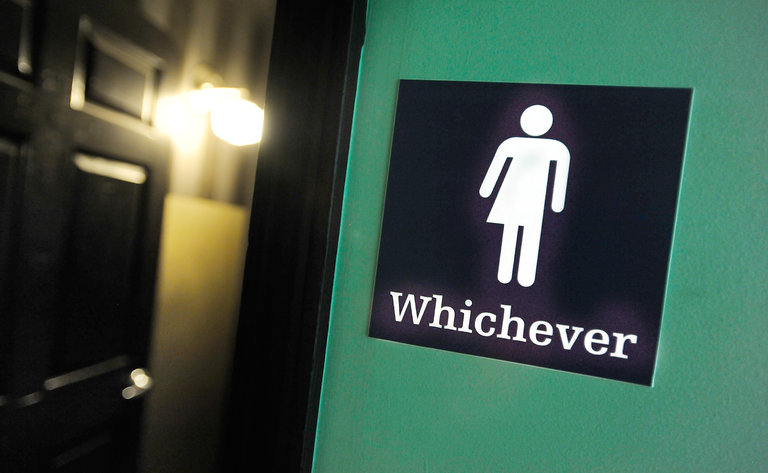the transgender, nonbinary Rev. Kori Pacyniak
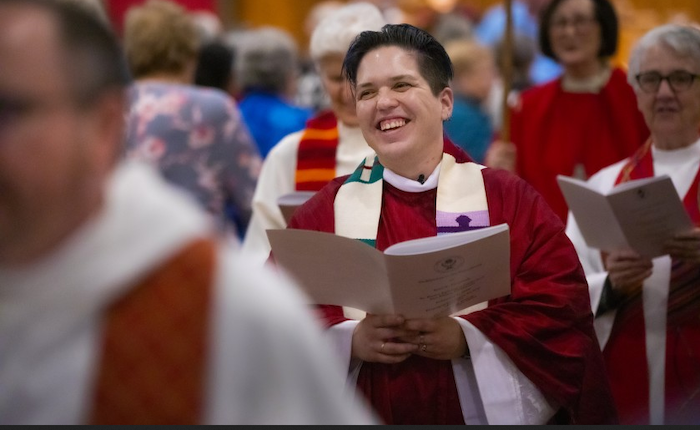
The Rev. Kori Pacyniak is believed to be the first transgender, nonbinary priest in the Roman Catholic Womenpriests movement
By Peter Rowe
The conversation began in typical fashion, with a question many grandparents ask: “When you grow up,” Kori Pacyniak’s grandmother wondered, “what would you like to be?”
At that point, the chat took an atypical turn.
“I want to be a priest,” said Kori, then an 8-year-old girl from a devout Polish Catholic family.
Grandmother: “Only boys can be priests.”
Kori: “OK, I want to grow up to be a boy.”
Now 37, Kori Pacyniak no longer wants to be male — or female. Pacyniak now identifies as nonbinary, someone who is not strictly feminine or masculine. (And someone who has abandoned gender-specific pronouns like “he” or “she” in favor of the more inclusive, if sometimes confusing, “they.”)
While Pacyniak left behind standard gender roles, the youthful fascination with the priesthood never faded. On Feb. 1, Pacyniak was ordained a priest in the Roman Catholic Womenpriests movement.
The Rev. Kori Pacyniak is now pastor of San Diego’s Mary Magdalene Apostle Catholic Community, a Serra Mesa church that preaches “A New Way to be Catholic.” For this parish, Pacyniak also represents a new way, as they are believed to be the first transgender, nonbinary priest.
Founded in 2005 by Jane Via and Rod Stephens, Mary Magdalene celebrates the Mass with a liturgy that, aside from some tweaks in the wording, would be familiar to most Roman Catholics. The church is not recognized by the San Diego diocese, however, and the Vatican has excommunicated several of the women ordained in what has become a global movement.
Mary Magdalene now has about 120 registered parishioners; 60 to 70 regularly attend 5 p.m. Sunday Mass at the church’s temporary home, Gethsemane Lutheran Church. Most in the congregation were raised as Catholics, yet were disillusioned by the church’s refusal to ordain women. Even among these believers, though, there was some initial hesitation about a nonbinary cleric.
“For some congregants,” said Esther LaPorta, president of Mary Magdalene’s board, “I think at first it might have been something to get used to.”
Among those who have had to adjust: Via, the 73-year-old pastor emeritus.
“I’m struggling to refer to Kori as ‘they,’” Via said. “When there is a single person and we know that is just one person, well, I’ve never used the word ‘they’ for a single person. I know Kori gets frustrated with me at times.”
Usually, though, the priest responds to this confusion with a charitable laugh.
“This is hard?” Pacyniak said. “Learning to spell my last name as a child was hard. Welcome to my world!”
A restless search
Kori Pacyniak grew up in Edison Park, a neighborhood on Chicago’s North Side. The tightly-knit Polish community shared a common language, customs and beliefs. Friends, neighbors and family, Kori’s comrades in the Polish Scout troop and Polish folkdancing troupe — all were Catholic.
Like many children, Kori daydreamed about careers. Some days, the goal was to become a Navy SEAL. On other days, a professional soccer goalie. Or a Catholic nun. Always, though, there was the hope that the impossible dream Kori had shared with a grandmother would, somehow, become possible.
“As they went through college and started studying theology, this really became a topic of conversation,” said Basia Pacyniak, 67, Kori’s mother. “It was very much what Kori wanted to do.”
Majoring in religious studies and Portuguese — “no employable skills,” Kori cracked — the undergraduate came out as bisexual. Pacyniak was still searching, though, still examining gender identity and career paths. Although president of Smith’s Newman Association, an off-campus Catholic organization, Pacyniak was frustrated by the church’s positions on women and sexuality.
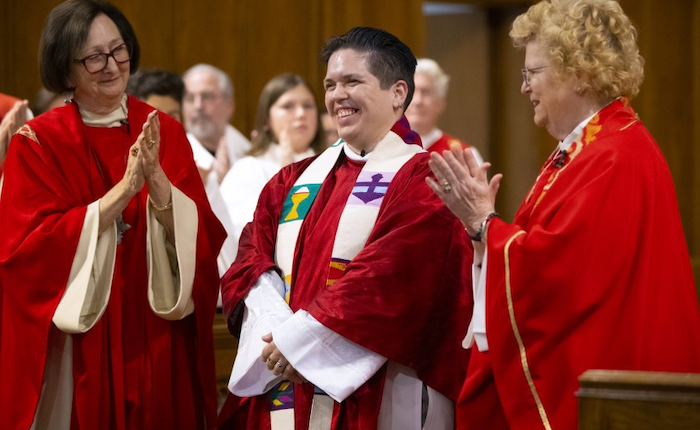
“Other people wanted to become president,” Pacyniak said. “I wanted to overthrow the Vatican.”
This restlessness continued post-graduation. After an administrative job in Los Angeles, Pacyniak enrolled in Harvard Divinity School’s master’s degree program. The new grad student came out as transgender and started to identify as male. This venture into masculinity was brief and unsatisfactory.
“I realized that box was just as restrictive as female,” Pacyniak said. “Neither male nor female identification works for me.”
For a time, Pacyniak considered converting to a church that, while similar in some ways to Catholicism, ordains women and welcomes LGBTQ clergy. Again, though, something didn’t seem quite right.
“I thought that might be my church home,” Pacyniak said of the Episcopal Church. “But am I too Catholic to be Episcopalian?”
Yet Catholicism posed barriers to Pacyniak. For one thing, Rome only recognizes two genders, male and female. And…
“Right now,” said Kevin Eckery a spokesman for the Roman Catholic Diocese of San Diego, “ordination is only open to natural born males.”
Pacyniak completed studies at Harvard, and later enrolled at Boston University’s School of Theology. There, Pacyniak studied how to minister to LGBTQ military service members in the years following the repeal of “Don’t Ask, Don’t Tell.”
But in 2016, a friend forwarded a job listing. Mary Magdalene needed a pastor. Candidates didn’t have to be ordained, if he, she or they were willing to work toward ordination.
In January 2017, Pacyniak began serving as Mary Magdalene’s pastor.
Queer theology
The Rev. Caedmon Grace is a minister at the Metropolitan Church of San Diego, a church that grew out of the LGBTQ community. Even here, there are ongoing discussions about the language of worship.
Consider John 3:16. A familiar New Testament verse, it’s often translated as “For God so loved the world, that he gave his only begotten Son…”
“Our practice in the MCC is to use inclusive language,” said Grace. “So that has become ‘For God so loved the world that God sent the begotten one.’ We’re not identifying God as male or female.”
This may not be the translation heard in most Christian churches, yet the emerging field of “queer theology” questions many of the assumptions of traditional religious prayer and practice.
“We have to get out of the hetero-nomative lens we use for understanding everything,” said Pacyniak, who is completing a doctorate in University of California Riverside’s queer and trans theology program. “We have to make trans and queer folks see themselves as part of the liturgy.”
Even at Mary Magdalene, a church that prides itself on its inclusive nature, this requires some work. When Pacyniak arrived, the liturgy included a line, “We believe that all women and men are created in God’s image.”
“This is great,” Pacyniak told Via after Mass. “But for people who don’t identify as women or men, that doesn’t work.”
The line was rewritten: “We believe that all people of all genders are created in God’s image.”
Creating a “spiritual support community” for trans and nonbinary people is a key goal of Mary Magdalene’s newly ordained priest. So is reaching out to the congregation’s men and women.
“Let’s make the tent as big and as open as we can,” Pacyniak said. “It’s an ongoing opportunity. Don’t get too comfortable; have conversations with people on the margins.”
All in good time
Through this past January, Via assisted Pacyniak on the altar during Mass. The new pastor studied, learning theology, liturgy and administrative duties, before being ordained as deacon in June 2019 and then, on Feb. 1, as a priest. More than 100 attended the ordination, so the ceremony was moved from Mary Magdalene’s small space to the soaring Gothic sanctuary of St. Paul’s Episcopal Cathedral.
The pews held Pacyniak’s parents, Basia and Bernard; brother, sister-in-law, two nephews and several cousins; friends from high school, Smith, Harvard and Boston U.; plus dozens of congregants from Mary Magdalene.
“Kori is very open and kind,” said Carol Kramer, who has attended Mary Magdalene for a decade. “I think they’ll be a really good pastor.”
Many religious traditions teach that we’re all created as complex, multi-faceted, beloved children of God. Pacyniak is a pastor and a student of queer theology, yes, but so much more: a baseball fan — with shifting allegiances, from Cubs to Red Sox to Padres — a regular Comic-Con attendee and, this priest insists, a Catholic. This brand of Catholicism may not be recognized by the Vatican, but that doesn’t bother Pacyniak’s parents, who remain practicing Roman Catholics.
“We are very proud of Kori,” said Basia Pacyniak. “The movement and the community is very welcoming, very open, and we are very supportive of that community. I feel that it is not in conflict with the Catholicism that we practice.”
The Pacyniaks foresee a day when their church will include women priests. Give it time, counseled Bernard Pacyniak, 66.
Lots of time.
“I imagine,” he said, “in 100 years this will all be part of one organization.”
Complete Article ↪HERE↩!


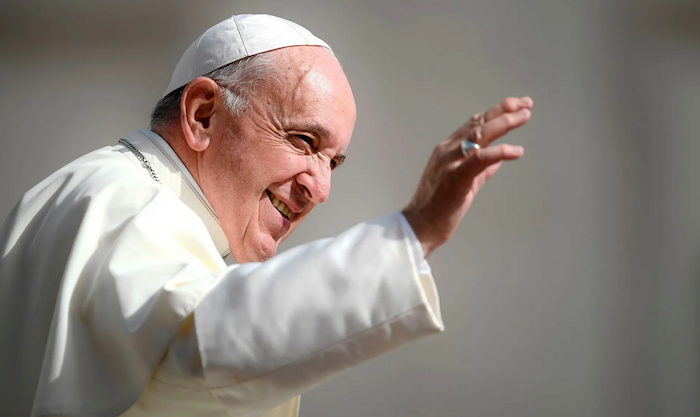
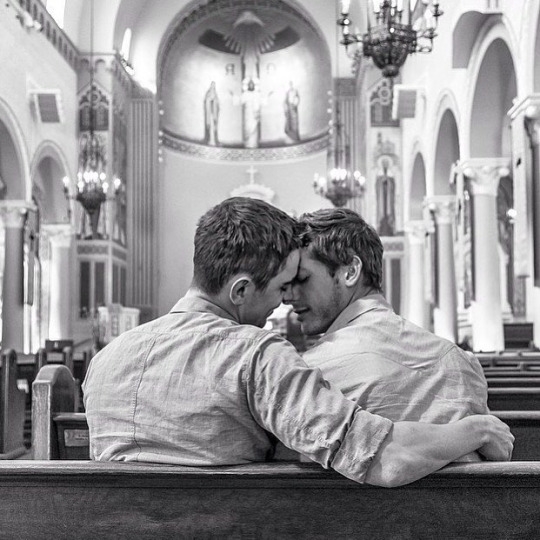
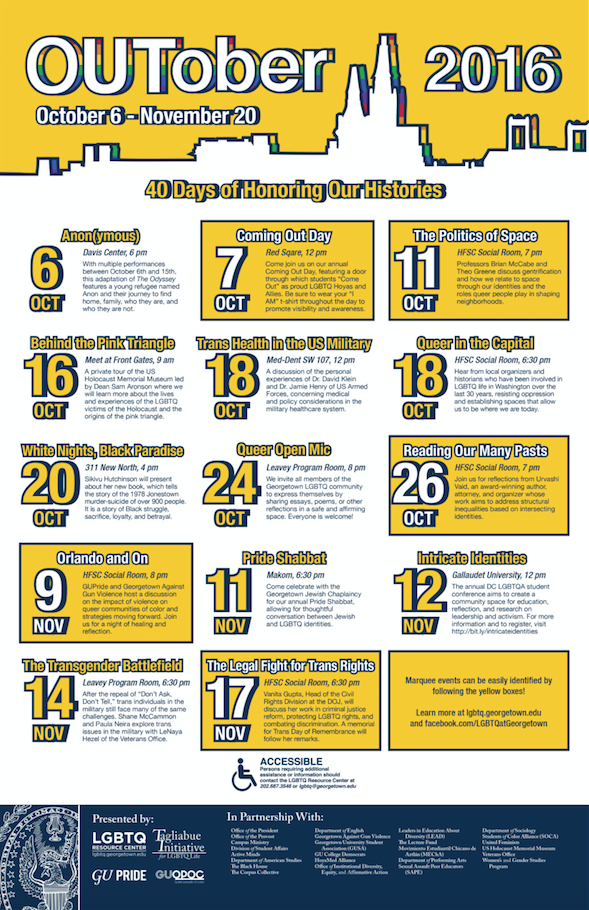 to members of the same sex. These sexual attractions are referred to in our current culture in terms of “identities” that define an individual. “Coming Out Day” celebrations serve to lead persons to embrace and be proud of those “identities,” which are rooted in sexual attractions and lifestyles considered either disordered or immoral by the Church.
to members of the same sex. These sexual attractions are referred to in our current culture in terms of “identities” that define an individual. “Coming Out Day” celebrations serve to lead persons to embrace and be proud of those “identities,” which are rooted in sexual attractions and lifestyles considered either disordered or immoral by the Church.